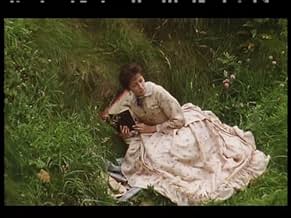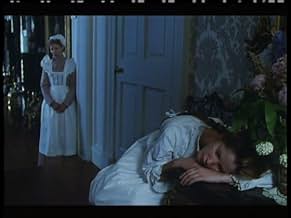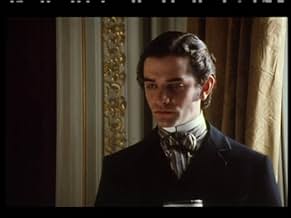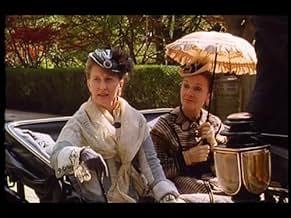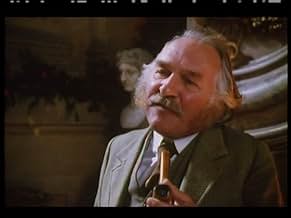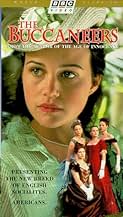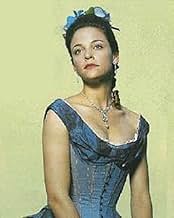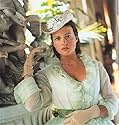Cuatro chicas estadounidenses van a Inglaterra a buscar marido.Cuatro chicas estadounidenses van a Inglaterra a buscar marido.Cuatro chicas estadounidenses van a Inglaterra a buscar marido.
- Premios
- 1 nominación en total
Explorar episodios
Opiniones destacadas
We almost gave up at the end of the first episode, which is slow moving and frivolous -- endless scenes of giggling young ladies behaving like thirteen year old girls. But by the end of the second episode we were glad we persisted. In the context of the full story, the carefree lives of the American girls before they get to England, although overdone, is a necessary contrast. This five episode mini-series is a watchable adaptation of Edith Wharton's last (and unfinished) novel. The characters are well drawn, the settings are sumptuous, and the depiction of upper-class English life in the late nineteenth century is believable and illuminating.
This film was magnificent and nothing short of breath taking. You know when you've got the talents of Mira Sorvino and Alison Elliot (Spitfire Grill) you can't go wrong. Not only were these actresses brilliant and believable, in their wretched marital situations, but I was also able to discover the talents of Cherie Lunghi and Carla Gugino. Gugino, especially shined as the philosophical and impetuous, Nan. Lush settings and beautiful costumes were just the crowing touches to this film that illustrated, wonderfully and very accurately, the foreign social customs of England and the USA in the 1870's. It also showed me how cruel it can sometimes be when the most crucial decisions in life are given to the young and innocent. Splendid entertainment and with all confidence I can truly say that this film is one of closest films to reach to perfection that I have ever seen.
Strangely Endearing Mixture of Childlike Snobbery, Titillating Sleaze, and Shrill Feminist Preaching
Everything about this lush mini-series is wrong, oversimplified, anachronistic, and just plain dishonest. Yet the results are strangely irresistible. The cast is what makes the difference. Mira Sorvino, Carla Gugino, Alison Eliot, and Rya Kihlstedt -- four utterly gorgeous young starlets, all of whom showed enormous promise, none of whom really topped their mid Nineties peak.
Imagine Charlie's Angels in corsets and lace, running here and there with fluttering lashes and heaving bosoms, determined to marry well or bust a bodice. And boy, do they ever! You will not believe the amount of leering sexuality in every scene, like a bad Seventies late night soap. Yet it's all so touchingly innocent, as if in every scene you can here the young actresses telling themselves, "This is culture! This is culture! Oscars await! It's CULTURE!"
To balance out the titillating sleaze, of course, the writers are very careful to make every last eligible bachelor an utter bucket of manure. Such a bold choice! Such intellectual daring it must have taken, to cop a fashionable feminist attitude and just slap it right down in the middle of the soft-core porn worship of all those country houses and heaving bosoms and bursting bodices and corsets laced tight. This is a story that preaches with shrill insistence while undercutting its own supposedly egalitarian message with childlike worship of money and social class.
Now when you read an actual, completed Edith Wharton novel, like THE CUSTOM OF THE COUNTRY, you will notice some interesting differences between the actual Wharton genius and the goofiness of this guilty pleasure. Undine Spragg is a pretty girl, and she wants a rich husband. But Undine is never any better than the people around her. In a lot of ways she is worse! When Edith Wharton sends her to Europe the whole point is that she really is a menace to the civilization she wants to conquer. "You want the things we want but you don't understand why we want them," says an exasperated French count.
That kind of complexity is completely absent from THE BUCCANEERS. The girls are awesome just because, hey, they're GIRLS!!!
Imagine Charlie's Angels in corsets and lace, running here and there with fluttering lashes and heaving bosoms, determined to marry well or bust a bodice. And boy, do they ever! You will not believe the amount of leering sexuality in every scene, like a bad Seventies late night soap. Yet it's all so touchingly innocent, as if in every scene you can here the young actresses telling themselves, "This is culture! This is culture! Oscars await! It's CULTURE!"
To balance out the titillating sleaze, of course, the writers are very careful to make every last eligible bachelor an utter bucket of manure. Such a bold choice! Such intellectual daring it must have taken, to cop a fashionable feminist attitude and just slap it right down in the middle of the soft-core porn worship of all those country houses and heaving bosoms and bursting bodices and corsets laced tight. This is a story that preaches with shrill insistence while undercutting its own supposedly egalitarian message with childlike worship of money and social class.
Now when you read an actual, completed Edith Wharton novel, like THE CUSTOM OF THE COUNTRY, you will notice some interesting differences between the actual Wharton genius and the goofiness of this guilty pleasure. Undine Spragg is a pretty girl, and she wants a rich husband. But Undine is never any better than the people around her. In a lot of ways she is worse! When Edith Wharton sends her to Europe the whole point is that she really is a menace to the civilization she wants to conquer. "You want the things we want but you don't understand why we want them," says an exasperated French count.
That kind of complexity is completely absent from THE BUCCANEERS. The girls are awesome just because, hey, they're GIRLS!!!
Seez, you seem to be very confused.
Edith Wharton and Jane Austen are two totally different authors. They both were women and both wrote socially-oriented novels, but that's about all they have in common.
Jane Austen was English. She lived from 1775 to 1817 and published only six books, two posthumously. The major theme of her books is genteel but impoverished young women trying to make advantageous marriages. She had nothing whatsoever to do with the story of The Buccaneers; she died 120 years before the book was written.
Edith Wharton was an American. A member of New York's old Society, she was born Edith Jones in 1862. She was married at age 23 to Teddy Wharton, a socially acceptable young man, but the union was not happy. She published her first book in 1900 and soon moved to France when she began to experience commercial success. She would spend much of the rest of her life in Europe, divorcing Teddy when he threatened to spend all her money, for as a best-selling author her income was large. Wharton's books center around the American social scene and the socially constricting expectations of that world; she usually portrays marriage as a sort of prison, as she herself experienced it. The Buccaneers (1937) was her last novel. She died before it was finished, but left an outline; it has actually been finished by several authors in several different versions based upon her notes.
And finally, it is not set in "the Regency period of English history" (that term refers specifically to the years 1811-1820). It is set in the 1870s.
Edith Wharton and Jane Austen are two totally different authors. They both were women and both wrote socially-oriented novels, but that's about all they have in common.
Jane Austen was English. She lived from 1775 to 1817 and published only six books, two posthumously. The major theme of her books is genteel but impoverished young women trying to make advantageous marriages. She had nothing whatsoever to do with the story of The Buccaneers; she died 120 years before the book was written.
Edith Wharton was an American. A member of New York's old Society, she was born Edith Jones in 1862. She was married at age 23 to Teddy Wharton, a socially acceptable young man, but the union was not happy. She published her first book in 1900 and soon moved to France when she began to experience commercial success. She would spend much of the rest of her life in Europe, divorcing Teddy when he threatened to spend all her money, for as a best-selling author her income was large. Wharton's books center around the American social scene and the socially constricting expectations of that world; she usually portrays marriage as a sort of prison, as she herself experienced it. The Buccaneers (1937) was her last novel. She died before it was finished, but left an outline; it has actually been finished by several authors in several different versions based upon her notes.
And finally, it is not set in "the Regency period of English history" (that term refers specifically to the years 1811-1820). It is set in the 1870s.
10bjrw
This movie, The Buccaneers, is one of my all-time favorite movies ever! I love everything about it. The lush, beautiful English homes and countryside. The amazing characters and awesome acting. The authenticity of the period (everything from costumes, hairstyles, sets, etc. - wonderful). The score is so beautiful. I could watch this movie over and over and over and love it each and every time.
The plot moves at just the right pace throughout the entire movie. Never too slow or dragging - but not to fast either - allows you to absorb the richness and beauty of the aristocratic homes (oh, they are so amazing!) and all that surrounds the story. I found myself totally drawn in to these characters in a way I rarely have in any other movie.
Do yourself a favor and watch this enchanting movie!
The plot moves at just the right pace throughout the entire movie. Never too slow or dragging - but not to fast either - allows you to absorb the richness and beauty of the aristocratic homes (oh, they are so amazing!) and all that surrounds the story. I found myself totally drawn in to these characters in a way I rarely have in any other movie.
Do yourself a favor and watch this enchanting movie!
¿Sabías que…?
- TriviaStory is loosely based on American heiresses Consuelo Vanderbilt, Jennie Jerome (Winston Churchill's mother), and Frances Work (great-grandmother of Princess Diana).
- Bandas sonorasLov'd I Not Honour More
Words by Richard Lovelace
Performed by Olive Simpson
Selecciones populares
Inicia sesión para calificar y agrega a la lista de videos para obtener recomendaciones personalizadas
- How many seasons does The Buccaneers have?Con tecnología de Alexa
Detalles
- Fecha de lanzamiento
- País de origen
- Idioma
- También se conoce como
- The Buccaneers
- Locaciones de filmación
- Burghley House, Stamford, Lincolnshire, Inglaterra, Reino Unido(Allfriars, home of the Brightlingseas)
- Productoras
- Ver más créditos de la compañía en IMDbPro
Contribuir a esta página
Sugiere una edición o agrega el contenido que falta


